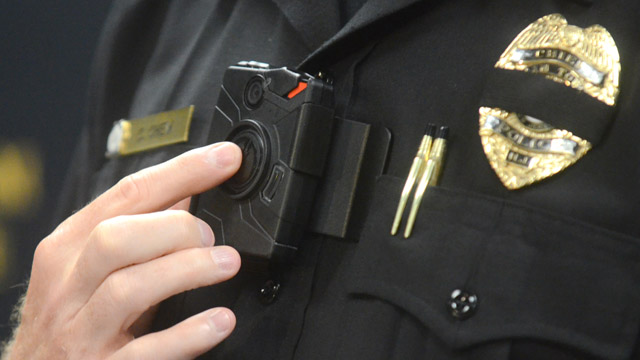TALLAHASSEE — Local law enforcement is taking steps to equip officers with body cameras, however, the process is more complicated than just purchasing the equipment and issuing it to the officers, according to representatives from the Leon County Sheriff’s Office (LCSO) and the Tallahassee Police Department (TPD).
TPD submitted an application on Feb. 10 for a $675,000 federal matching grant between the City of Tallahassee and TPD to purchase body cameras and accessories to equip 20 to 25 of its officers on patrol.
“We have six or seven cameras now for our motorcycle patrols and have some in cars,” said TPD Public Information Officer Dave Northway. “This grant would be for the officers on patrol who come in contact with the public.”
LCSO does not plan to equip deputies with body cameras until its policies and procedures are in place.
“Sheriff McNeil believes the use of body cameras by deputies is a good tool to provide transparency of their actions and demonstrate their consistent professionalism,” LCSO Chief of Staff David Folsom said.
“He intends to move forward with their use once all technical and privacy requirements are properly established,” Folsom continued.
Both agencies agree purchasing the cameras is the easy part.
According to Northway, “The real challenge is the cost to manage it.”
Northway said it is intended that the grant money TPD has applied for will cover infrastructure and staffing associated with the cameras, but they won’t know for certain until everything is priced out.
“The use of cameras requires a comprehensive infrastructure comprised of data storage, support staffing, and technical maintenance which must be a part of the use plan,” Folsom explained.
Folsom said, “In addition to the purchase of hardware, such as the cameras, it is necessary to employee staff to review the hours of recording to maintain privacy rights. Recordings exempted by law may include domestic violence victims, inside personal residences in some cases, medical incidents, mental health events, and juveniles.”
“In order for the cameras to be effective tools, they must be properly deployed with an adequate data storage capability to maintain all recordings as required by law, staff to review all recordings requested and delivered timely to citizens, and the establishment of policies to ensure adherence to privacy laws,” he said.


Wait a second $675,000 to equip 20-25 officers? Seriously $27,000 per 25 officers? I can get Go Pro for dirt cheap. And you all wonder why there is not trust in government.
I would not trust a go pro at all in a police body cam situation. they don’t do automated activations, they don’t do automated file transfers and they do not have the forensically accurate time stamping and meta data systems that even the most basic police level body cam system have. They need cams that can be used 24/7 by multiple people, be recharged quickly and more importantly work when they’re supposed to.
Right now, TPD uses body cams for their motorcycle unit and they’re manually activated. I’m not sure if that’s the perfect solution.
A larger part of the cost of these systems are the retention servers that have to keep data for up to a decade in some cases. For 1080p video, it’s about 5-10 gigs per hour for recordings, which is about 3Tb a day for 25 units. That’s roughly 10,950,000Tb in storage cost alone. You have to roughly double that to account for backups, as those drives will eventually fail. Then they need an operating system for retrieval, all while maintaining the chain of custody.
All that said though, there’s already plenty of vendors out there that would love to just do it all for you. It’s cheaper to roll your own system, but it’s more manageable and trustworthy if it’s from a vendor.